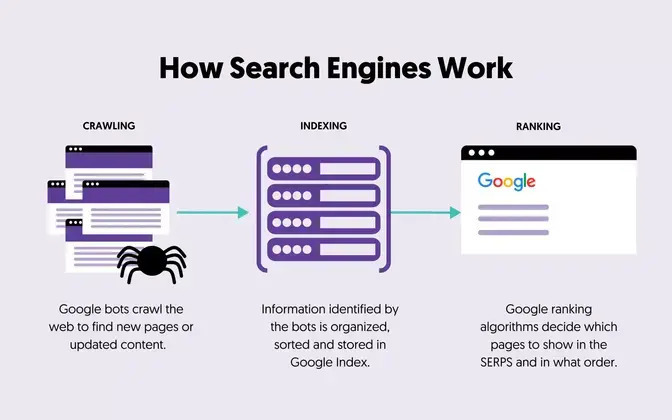SEO might sound like a buzzword, but it’s a critical aspect of building a website that reaches your audience.
For beginner developers like you and me, understanding the basics of SEO can significantly improve your site’s visibility on search engines like Google, Bing, and Yahoo.
SEO isn’t magic or a secret formula. It’s a set of techniques used to make your website more appealing to search engines, so they rank it higher.
Since 53% of website traffic comes from organic searches, getting your SEO basics right from the start can make a massive difference.
Let’s learn some essential SEO concepts and techniques that every developer should know.
How Search Engines Work

Search engines use bots to crawl the web and index websites. When someone searches for something, the engine's algorithm looks through this indexed data to show relevant results. Your job is to make your website easy to crawl, index, and rank higher.
Crawling
Search engine bots (like Googlebot) scan your website to discover new or updated pages.
Indexing
The process of storing and organizing the content found during the crawl.
Ranking
Once indexed, pages are ranked based on relevance to the user's search query and other ranking factors.
To learn in detail please visit this How Do Search Engines Work?
On-Page SEO is the Foundation
On-page SEO is about optimizing individual web pages to rank higher. This includes aspects like content, HTML source code, and keyword placement. It’s one of the most basic yet important aspects of SEO.
Use Semantic HTML
Use proper tags like <header>, <article>, and <footer>. This helps search engines understand your content better, making it easier to index.
Title Tags and Meta Descriptions
These are small but powerful. The title tag appears in search results as the clickable headline, while the meta description is the summary under the title. Always include keywords in both.
See this example:
- Title
Beginner's Guide to SEO Basics
- Meta Description
Learn the essential SEO basics every beginner developer should know, from keywords to on-page optimization.
Must Optimize for Mobile
Since Google now uses mobile-first indexing, your site needs to be mobile-friendly. This means ensuring that it looks good and works well on phones and tablets, which is where most people browse the web nowadays.
Responsive Design: Use responsive web design to ensure your website adapts to different screen sizes. Tools like Google’s Mobile-Friendly Test can help you see if your site meets mobile standards.
Page Speed: Ensure your site loads quickly. A slow website can cause users to leave, increasing your bounce rate and negatively affecting your SEO.
Keywords are a heart SEO
Keywords are the phrases people type into search engines. Knowing the right keywords to use helps you attract the right audience. But it’s not just about stuffing them into your content—it’s about strategically placing them.
Instead of focusing on a single competitive word like “SEO,” target longer, more specific phrases like “SEO basics for beginners.”
Use keywords naturally in your headings, title tags, meta descriptions, and throughout your content.
Technical SEO
Technical SEO involves optimizing the backend structure of your website. While it sounds complicated, there are simple steps beginners can take to ensure their site is technically sound.
Use HTTPS
Google prefers secure websites. If your site isn’t HTTPS, you’re missing out. Ensure you get an SSL certificate to secure your site.
Sitemap
Create an XML sitemap to help search engines crawl and index your site. A sitemap lists all the important pages and helps search engines navigate your site.
Robots.txt
This file tells search engine bots which pages they can or cannot crawl. Use it wisely to avoid blocking essential pages from being indexed.
Also Read:
Is React JS a Good Choice for SEO Optimization?
A Short and Simple Guide to Boosting SEO for Custom Coded Websites
Content is Still King
Content is one of the most significant factors in SEO. Search engines want to deliver valuable, relevant content to users. Make sure your content is easy to read, informative, and updated regularly.
Write for Humans, Not Just Search Engines: Avoid stuffing your content with keywords. It should flow naturally and offer value to your audience. Google’s algorithm is smart and can tell if you're just keyword stuffing.
Update your content regularly. Outdated content can lead to a drop in rankings, so keep it fresh and relevant.
Backlinks to Build Authority
Backlinks are links from other websites pointing to your site. They act as votes of confidence in your content. The more reputable the site linking to you, the better for your SEO.
Don’t just aim for any link—ensure that you’re getting links from authoritative sites in your industry. A single high-quality backlink can have more impact than several low-quality ones.
Don’t try to trick search engines by buying backlinks or using shady tactics. Google penalizes sites that engage in such practices.
Learning and mastering SEO takes time, but as a beginner developer, focusing on the basics like mobile optimization, keywords, and quality content can go a long way.
Once you get a good handle on these, you can dive deeper into more advanced SEO tactics.
Also read this: Boost SEO for Custom-Coded Websites



